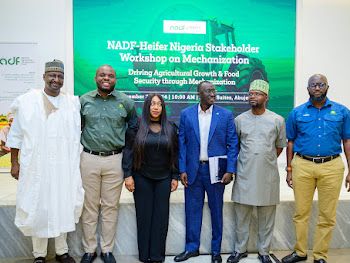The National Agricultural Development Fund (NADF) and Heifer International Nigeria, have initiated a programme aimed at deploying 10,000 tractors to Nigerian farmers within a period of 5 years.
The initiative said to be set for its pilot phase, will start with the deployment of 2,000 tractors within the next six months.
This disclosure was made recently during a Stakeholders’ Mechanization Workshop, held in Abuja.
Mohammed Ibrahim, the Executive Secretary of NADF, said the tractor Programme was created to solve the mechanization problems which have continued to undermine the agricultural revolution in the country.
Ibrahim noted NADF would remain dedicated to addressing challenges that militate against efforts to food security in Nigeria, while also empowering farmers with needed tools for productivity.
Ibrahim said, ” Mechanization in Nigeria has become a bit of a challenge, as you’re all aware. Our mechanization rates are very low, and this directly impacts our farmers’ yields and broader economic development indices. This program seeks to introduce 2,000 tractors in the pilot phase with the objective of achieving a robust and inclusive implementation plan.
“We’ve invited stakeholders to share their experiences, identify pain points, and offer solutions. This collective input will guide us in creating a sustainable and inclusive framework for implementation.
“This is just one of five mechanization programs planned under the administration of President Bola Ahmed Tinubu. The goal is to radically transform Nigeria’s agricultural landscape, create job opportunities, and foster economic growth through modernized farming practices, NADF’s Boss added.
In his remarks, Country Director of Heifer International Nigeria, Dr. Lekan Tobe, said his organization was collaborating with NADF to create easy access to mechanization for farmers.
“Tractors rarely come to mind when we think of agricultural technology, but they are indispensable in enhancing productivity.
“The commitment of stakeholders, many of whom are present today, is crucial to realizing this vision. It’s about creating a ripple effect—jobs, training, and maintenance opportunities beyond the immediate deployment of tractors,” Tobe said.















